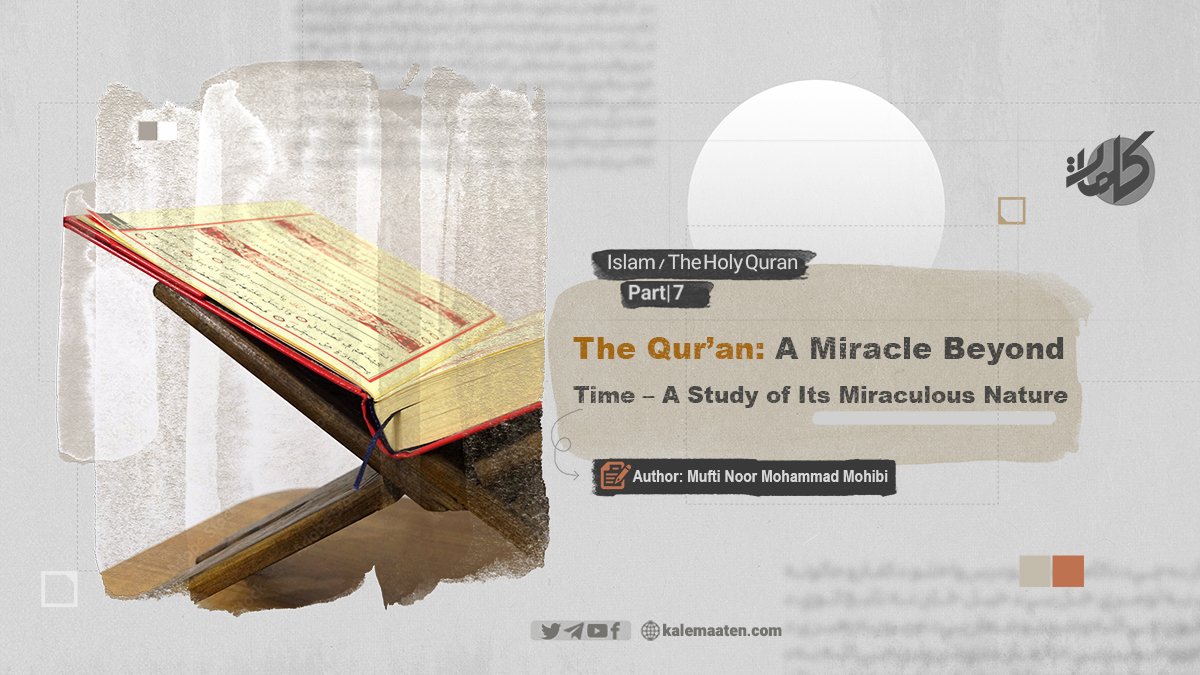Author: Mufti Noor Mohammad Mohibi
The Qur’an: A Miracle Beyond Time- A Study of Its Miraculous Nature (Part 7)
Perspectives on the Aspects of the Quran’s Inimitability
The Holy Quran, regarded as the greatest miracle of the Prophet of Islam (PBUH), has always been unanimously accepted by the Muslim ummah throughout Islamic history as miraculous and superior to all other revealed scriptures.
A significant issue discussed in the history of Islamic theology and philosophy is the question: Why are human beings unable to produce anything like the Quran? To answer this question requires analyzing various views held by Islamic sects, each of which has examined this issue from theological, philosophical, rhetorical, or spiritual angles. We now explain the different perspectives on this matter.
First: The View of Ahl al-Sunnah wa’l-Jama‘ah on the Aspects of the Quran’s Inimitability
The scholars of Ahl al-Sunnah wa’l-Jama‘ah regard the inimitability (i‘jāz) of the Quran as multifaceted and enumerate the following dimensions:
1. Linguistic and Structural Inimitability
The Quran has a unique composition in its use of words, the arrangement of phrases, and the harmony and rhyming of verses. This unprecedented structure stands apart from any other form of Arabic expression—be it poetry or prose—and possesses its own distinct style, known as the Quranic order (naẓm al-Qur’ān).
2. Unique Literary Style
The Quran’s method of expression, especially in the openings and endings of verses, differs from all conventional Arabic literary styles such as praise (madḥ), elegy (marthiyah), satire (hijā’), love poetry (ghazal), or war chants (rajaz). This distinction is not only in form but also in the wise and profound content of the verses.
3. Sublime Content and Semantic Eloquence
The themes of the Quran exhibit such depth, dignity, and eloquence that they seem beyond human capability. Verses like: “لِمَنِ الْمُلْكُ الْيَوْمَ لِلَّهِ الْواحِدِ الْقَهَّارِ” Translation: (“To whom belongs [all] sovereignty this Day? To Allah, the One, the Irresistible.” [Ghafir: 16])
and “وَيُرْسِلُ الصَّوَاعِقَ فَيُصِيبُ بِهَا مَنْ يَشَاءُ” Translation: (“And He sends thunderbolts and strikes with them whom He wills.” [Ra‘d: 13]) are examples of the Quran’s absolute divine majesty and eloquence, transcending any human speech.
4. Complete Mastery of the Arabic Language
The Quran employs words with such precision and appropriateness that not even the most eloquent Arabs (the fuṣaḥā’ and bulaghā’) have been able to replicate its style. Every word is placed in its perfect context—something beyond the capacity of any ordinary human, no matter how literarily skilled.
5. Knowledge of the Unseen
a. Knowledge of the Past: The Quran accurately recounts the histories of past nations and prophets, which correspond remarkably with the scriptures of the People of the Book, even though the Prophet (PBUH) was unlettered (ummī).
b. Knowledge of the Present Unseen: It informs about metaphysical realities like the attributes of angels, the states of hypocrites, Paradise, and Hell—matters beyond human knowledge, conveyed solely through divine revelation.
c. Knowledge of the Future: Examples include the prediction of the Byzantine victory over the Persians, the Prophet’s (PBUH) preservation from assassination attempts, and the Quran’s own claim that no one will ever be able to match it—all clear signs of divine origin.
6. Fulfillment of Quranic Promises
All promises made in the Quran concerning the support of believers and the destruction of enemies have been fulfilled without exception, which is itself a clear proof of its divine source.
7. Profound Wisdom and Comprehensive Knowledge
The Quran contains knowledge, laws, and wisdom that could not have been independently presented by any human—especially not with such breadth and perfect order.
8. Emotional and Spiritual Impact
The Quran deeply affects the human soul. Many people embraced Islam simply upon hearing its verses, even without prior instruction. For example, Jubayr ibn Mut‘im was moved by verses from Sūrat al-Ṭūr and accepted Islam.
9. Internal Consistency and Absence of Contradiction
Despite its vast subject matter, the Quran contains no real contradictions. Any apparent discrepancies are due to human misunderstanding and are resolved through careful exegesis.
10. Comprehensive Ethical and Legal System
The Quran provides complete principles for all dimensions of human life—social, political, economic, military, and personal—and will continue to meet humanity’s needs until the Day of Judgment.
11. No Weariness from Repetition
A reciter never tires of repeating the Quran, and each hearing brings new delight to the listener. This quality is beyond ordinary human speech.
12. Ease of Memorization
Despite the vastness of its content, the Quran is remarkably easy to memorize—an exceptional trait not found in other lengthy texts.
13. Protection from Distortion
From its revelation until today, the Quran has remained unchanged and unaltered, and it will remain so until the end of time.
14. Quranic Challenge (taḥaddī)
The Quran openly challenges all of humanity to produce anything like it. Despite this challenge, no one has succeeded or will ever succeed.
Second: The View of the Mu’tazila (Nizam) and the Qadriyyah (Doctrine of Ṣarfah)
Nizam of the Mutazilite school claimed that the inimitability of the Quran is due to ṣarfah, meaning that God prevented people from countering the Quran. This view is rejected for the following reasons: The Quran repeatedly invites opponents to challenge it. The Arabs were renowned for their literary pride and competition in poetry and eloquence—had they been capable, they certainly would have responded.
The failure to match the Quran is an innate incapacity, not one imposed by force.
Third: The View of Sharif al-Murtaza
Sharif al-Murtaza, a prominent Shiite scholar, held a view similar to Nizam’s. He believed that Allah removed from the disbelievers the necessary knowledge to counter the Quran. However, this view conflicts with the verse: “قُل لَّئِنِ اجْتَمَعَتِ الإِنسُ وَالْجِنُّ عَلَى أَن يَأْتُواْ بِمِثْلِ هَـذَا الْقُرْآنِ” This verse assumes all possible resources, conditions, and collaborations—yet still affirms the utter human incapacity to rival the Quran. [1]
Continues…
Previous Part/ Next Part
[1] Summarized from Al-‘Irfān fī ‘Ulūm al-Qur’ān, pp. 71–79 and other sources.



